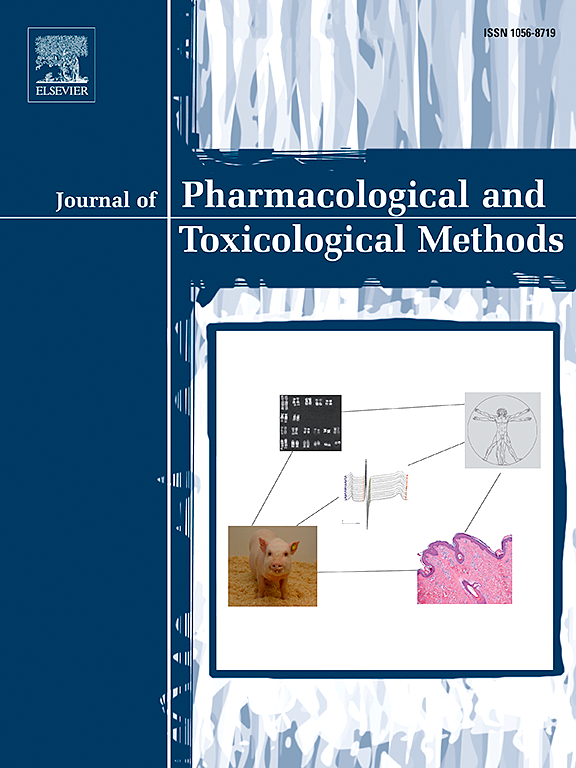A retrospective review of the effects of moxifloxacin in dogs at four different test sites
IF 1.8
4区 医学
Q4 PHARMACOLOGY & PHARMACY
Journal of pharmacological and toxicological methods
Pub Date : 2025-09-01
DOI:10.1016/j.vascn.2025.107781
引用次数: 0
Abstract
With adoption of the ICH E14/S7B Q&A best practice guidance, non-clinical cardiovascular data sets can be used in place of clinical data to support of a TQT waiver application. However, as part of this guidance each laboratory is required to demonstrate adequate sensitivity of their specific in vivo model using a known positive control agent (e.g., moxifloxacin) or through retrospective review of historical data sets. These requirements raise questions around how often a positive control study should be conducted and how stable the effects of moxifloxacin are across multiple laboratories. In the current review we assessed the effects of moxifloxacin, in dogs, from four test sites. All four laboratories administered moxifloxacin at 10, 30 and 90 mg/kg by oral administration and evaluated cardiovascular parameters for 24 h post administration. The study designs between labs differed slightly, with test sites 1 and 2 utilizing a traditional 4*4 cross-over design in a single housing paradigm, test site 3 utilizing a 4*4 cross-over design with paired housing, and test site 4 utilizing a modified cross-over design with only two dose levels assessed per day. Additionally test site 1, used female animals, with other sites using males. Concentration-QTc modeling was also conducted at two sites with minor site-to-site variances in the blood sample collection methods and timing observed. All sites illustrated comparable dose dependent increases in QTc prolongation. Administration at 90 mg/kg resulted in QTc prolongation of up to 30.5, 35.6 33.2 and 31.2 msec, relative to control, at test sites 1, 2, 3 and 4 respectively. Whilst a review of study specific least significant difference, ranged from 6.4 to 11.1 msec, and residual error ranged from 4.1 to 6.4 msec; with conc-QT modeling, at test site 1 and 4,indicating that concentration ranges of 2867 to 2937 ng/ml would be expected to induce a 10-msec prolongation. These results indicate that when following best practice methodologies, dog CV models are highly consistent, independent of laboratory. This suggests that repeated administration of moxifloxacin across all laboratories is not essential and reliance on historical data sets alone should suffice to confirm model suitability.
莫西沙星在四个不同试验地点对狗的影响的回顾性回顾
随着ICH E14/S7B Q&;A最佳实践指南的采用,非临床心血管数据集可以代替临床数据来支持TQT豁免申请。然而,作为本指南的一部分,要求每个实验室使用已知的阳性对照剂(例如莫西沙星)或通过对历史数据集的回顾性审查来证明其特定体内模型的足够敏感性。这些要求提出了以下问题:应多久进行一次阳性对照研究,以及莫西沙星在多个实验室中的作用有多稳定。在当前的综述中,我们评估了莫西沙星对狗的影响,来自四个试验点。所有四个实验室均口服莫西沙星10、30和90 mg/kg,并评估给药后24 h的心血管参数。实验室之间的研究设计略有不同,试验点1和2在单一住房范例中使用传统的4*4交叉设计,试验点3使用配对住房的4*4交叉设计,试验点4使用改进的交叉设计,每天仅评估两个剂量水平。另外,试验点1使用雌性动物,其他试验点使用雄性动物。还在两个地点进行了浓度- qtc建模,观察到血液样本采集方法和时间在不同地点之间存在较小差异。所有位点均显示QTc延长的剂量依赖性增加。在试验位点1、2、3和4,给药剂量为90 mg/kg导致QTc延长30.5、35.6 33.2和31.2 msec,相对于对照。而对研究特定的最不显著差异的回顾,范围为6.4至11.1 msec,残差范围为4.1至6.4 msec;通过conc-QT建模,在测试位点1和4,表明浓度范围为2867至2937 ng/ml预计会诱导10毫秒的延长。这些结果表明,当遵循最佳实践方法时,狗的CV模型是高度一致的,独立于实验室。这表明在所有实验室重复使用莫西沙星是不必要的,仅依靠历史数据集就足以确认模型的适用性。
本文章由计算机程序翻译,如有差异,请以英文原文为准。
求助全文
约1分钟内获得全文
求助全文
来源期刊

Journal of pharmacological and toxicological methods
PHARMACOLOGY & PHARMACY-TOXICOLOGY
CiteScore
3.60
自引率
10.50%
发文量
56
审稿时长
26 days
期刊介绍:
Journal of Pharmacological and Toxicological Methods publishes original articles on current methods of investigation used in pharmacology and toxicology. Pharmacology and toxicology are defined in the broadest sense, referring to actions of drugs and chemicals on all living systems. With its international editorial board and noted contributors, Journal of Pharmacological and Toxicological Methods is the leading journal devoted exclusively to experimental procedures used by pharmacologists and toxicologists.
 求助内容:
求助内容: 应助结果提醒方式:
应助结果提醒方式:


